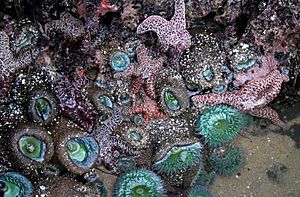Biocoenosis facts for kids
A biocenosis is a group of living things, like animals, plants, and tiny microbes, that live and interact together in a specific place. This place is called their habitat. You might also hear it called a biotic community or ecological community. The idea was first described by a scientist named Karl Möbius in 1877.
Ecological communities can be divided into different types based on the living things they include:
- Zoocenosis is for the animal community.
- Phytocenosis is for the plant community.
- Microbiocenosis is for the community of tiny living things, like bacteria.
The area where a biocenosis lives is usually limited to where the types of species are mostly the same.
What is an Ecosystem?
An ecosystem includes a biotic community (or biocenosis) and its physical surroundings. This means it's not just the living things, but also the non-living parts like water, soil, and air.
Scientists study ecosystems to understand how different species interact with each other. They also look at how these species interact with their physical environment. This helps us understand the natural world better.
Understanding Biotic Communities

Biotic communities come in many sizes. A large community might even contain smaller ones within it. One easy way to see how species interact is by looking at their feeding relationships, also known as a food network.
By mapping out who eats whom, scientists can figure out the boundaries of a community. They try to draw a line where there are the fewest connections between species inside and outside the boundary.
Mapping these communities is very important for protecting nature. For example, in the UK, special areas are identified as Sites of Special Scientific Interest (SSSIs). These places are important because they have unique biotic communities that need protection.
See also
 In Spanish: Biocenosis para niños
In Spanish: Biocenosis para niños
- Community (ecology)
- Population biology
 | Janet Taylor Pickett |
 | Synthia Saint James |
 | Howardena Pindell |
 | Faith Ringgold |

